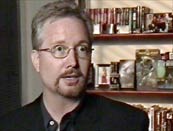What is the real difficulty for a producer of a really long running series?
 One of the tough things in producing a science fiction series on a week-to-week basis is just staying fresh. Farscape goes to different planets. We visit new civilisations on a regular basis, something that the original Star Trek did quite often.
One of the tough things in producing a science fiction series on a week-to-week basis is just staying fresh. Farscape goes to different planets. We visit new civilisations on a regular basis, something that the original Star Trek did quite often.
Next Generation and Voyager do something which from a production standpoint is very, very smart. They played most of the episodes, on board the ship itself. The advantage that they had was that they had a mostly human crew, so that they could actually go down and find other areas of the ship and meet up with characters whom we�d never met before. You�d have fresh episodes with new characters, even though you essentially said that these characters have been on board all the time and we�re just introducing them to you for the first time.
On Farscape something that Brian Hansen and I wanted to do from the beginning was have John Crichton be the only human in this end of the universe. There are Sebaceans, a species that look like him, but we didn�t want to populate the show with a lot of Sebaceans.
The original concept of the series was to have a ship like Star Trek, where you had hundreds of characters on board the ship, and were able to play more episodes within the ship. The problem was we couldn�t afford to do the make-up on all these aliens, just to have them walk down the hallway to portray a ship that was populated as heavily.
So we pulled back and said let�s make it a small crew of five, which worked better. But that forced us to then go outside and go down to planets and other ships and things to meet up with the threat.
It�s a tough thing to do. We shoot in Sydney, Australia, which helps us a lot, because they�re just bolder down there, in terms of production. They�re willing to take a lot of chances. They�ve also got real exotic exterior locations so we can portray alien worlds and all of that.
